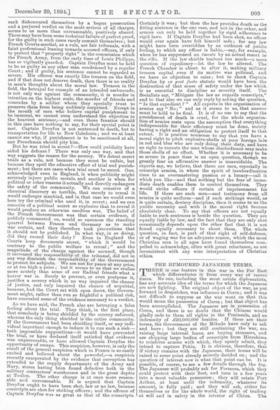THE TRIAL OF CAPTAIN DREYFUS.
WE cannot fully sympathise either with the English or the French feeling about Captain Dreyfus. The English feeling is that he has been hardly treated, and we fail entirely, on the face of the evidence, to see that. As. we read the facts reported from Paris, that officer, though a well-to-do man,- wanted for his pleasures more than he had, and sold to the German Intelligence Department, over which, we should remark, the German Embassy in Paris has no sort of control, the beads of the plan resolved upon for the mobilisation of the French Army in the event of an emergency upon the North-Eastern frontier. Captain Dreyfus denies the fact, but the evidence completely satis- fied a Court-martial of seven general officers, and the Minister of War, and the Cabinet, and. must, as it seems to us, be accepted to have been sufficient. Captain Dreyfus was defended by counsel, he was neither a poor man nor a man without friends, and to suppose that General Mercier and seven officers of rank dishonoured themselves by a bogus prosecution and a perjured verdict on the most serious of all charges, seems to us more than unreasonable, positively absurd. There may have been some technical failure of perfect proof, for the guilty in such cases rarely commit themselves; but French Courts-martial, as a rule, are fair tribunals, with a faint professional leaning towards accused officers, if only to protect that "property right" in the commission which the French Army, from the early time of Louis Philippe, has so vigilantly guarded. Captain Dreyfus must be held to be as guilty as any other man condemned by a regular Court ; and if guilty, his sentence cannot be regarded as severe. His offence was exactly like treason on the field, and, if that does not deserve death, then there is no reality in men's thoughts about the moral law. Treason in the field, the betrayal for example of an intended ambuscade, is not only war against the community, it is murder in intention on the highest scale, the murder of friends and comrades by a soldier whom they specially trust to preserve them from being suddenly surprised. Except in the mouth of men who believe capital punishment to be immoral, we cannot even understand the objection to the heaviest sentence,—and even those fanatics should in this case have nothing to say, for their special point is met. Captain Dreyfus is not sentenced to death, but to transportation for life to New Caledonia ; and we at least cannot see why, if punishment is to be sanctioned at all, any Frenchman should pity him. But he was tried in secret P—How could publicity have aided his defence ? There was only one way, and that way suggests the reason for the secrecy. We detest secret trials as a rule, not because they must be unfair, but because they spoil the educative effect of trial and punish- ment; but there are cases when trial must be secret. One, acknowledged even in England, is when publicity might seriously injure public morals, and another is when for political or other reasons it actually and directly endangers the safety of the community. We can conceive of a chemical discovery so terrible, that merely to reveal it would endanger mankind, and in that case we would even here try the criminal who used it, in secret ; and we can conceive of a political secret so explosive that to reveal it would produce an otherwise needless war. The belief of the French Government was that certain evidence, if publicly commented on, would so envenom the standing quarrel between France and Germany as to make war certain, and they therefore took precautions that it should not be published. In what way, in so doing, did they exceed their duty ? Even iu England the Courts keep documents secret, "which it would be contrary to the public welfare to reveal ; " and the magnitude of the charge against the accused, though it increased the responsibility of the tribunal, did not in any way diminish the responsibility of the Government to protect its subjects. We are not for peace at any price, or at too high a price ; but it seems to us that we realise more acutely than some of our Radical friends what a horror war is. Surely to prevent, or even postpone it, justifies a secrecy which in no way impaired the chance of justice, and only impaired the chance of acquittal, because, had the Court sat with open doors, the Govern- ment might, rather than run so frightful a political risk, have concealed some of the evidence necessary to a verdict.
As we have said, the French also are betraying a false feeling about the trial. They think, in the first place, that somebody is being shielded by the secrecy enforced, whereas the only thing shielded is the entire community. If the Government had been shielding itself, or any indi- vidual important enough to induce it to run such a risk— both impossible suppositions—it would have prevented the trial, or have declared itself satisfied that evidence was unprocurable, or have allowed Captain Dreyfus the opportunity of escape. This suspicion, however, is only the result of the general suspicion which in France is so easily excited and believed about the powerful,—a suspicion recently exasperated by the evidence that corruption has extended to the supply departments of the Army and Navy, stores having been found defective both in the military contractors' warehouses and in the great depots at Toulon. The other charge is at once more reason- able and unreasonable. It is argued that Captain Dreyfus ought to have been shot, law or no law, because conscripts are shot for striking officers ; and the offence of Captain Dreyfus was as great as that of the conscripts. Certainly it was ; but then the law provides death as the fitting sentence in the one case, and not in the other, and armies can only be held together by rigid adherence te rigid laws. If Captain Dreyfus had been shot, no officer would ever again have felt himself safe ; for any law might have been overridden by an outburst of public feeling, to which any officer is liable,—say, for example, when he has suppressed an emeute by an actual resort to the rifle. If the law shields traitors too much—a mere question of expediency—let the law be altered. The French Chamber is about to alter it, making military treason capital even if its motive was political, and we have no objection to raise ; but to shoot Captain Dreyfus by ex post facto statute would have been the destruction of that sense of safety under the law which is as essential to discipline as severity itself. The Socialists say, "Mitigate the law as regards conscripts," and to that also we can only reply by asking the question, "Is that expedient?" All experts in the organisation of armies say " No; " and as it seems to us, that answer must be held to be final. It is of no use to say that the punishment of death is cruel, for the whole organise- ta. on of armies rests upon the assumption that everything indispensable for their efficiency must be done, society having a right and an obligation to protect itself to that extent.. It is positive nonsense to say that you have a Floral right to pitch explosive-shells at poor foreign lads in red and blue who are only doing their duty, and have no right to execute the man whose disobedience may make those shells of no effect. Whether it is necessary to be so severe in peace time is an open question, though we greatly fear an affirmative answer is unavoidable. The experts say, we believe, that there are men, especially in conscript armies, in whom the spirit of insubordination rises to an overmastering passion or a lunacy—call it which you like—and that nothing but the fear of imme- diate death enables them to control themselves. They would strike officers if certain of imprisonment for life. If there are such men—and testimony from all armies is quite uniform—and if such strikings would, as is quite certain, destroy discipline, then it seems to us the public necessity and with it the moral right become absolutely clear. To say that officers are not equally liable to such sentences is beside the question. They are equally liable by law, and the fact that they are only shot occasionally depends upon the other fact that it is not found equally necessary to shoot them. The whole question, in fact, is part• of that right of self-defence, or of waging war for an adequate reason, which the most Christian men in all ages have found themselves com- pelled to acknowledge, often with great reluctance, as not inconsistent with any wise interpretation of Christian ethics.



































 Previous page
Previous page